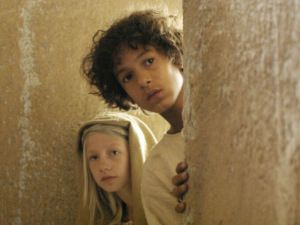Opinion
Englishman in Nyhavn: Julekalender season – the gift that keeps giving
Jack Gardner
This article is more than 5 years old.

Kid Jesus, your career’s behind you
Yet another Christmas dawns in Denmark. For us natives, it’s no biggie. I’m actually so acclimatised to this Scandinavian cove we call home, that – and I’m chuckling heartily here – it’s difficult to remember what Christmas is like elsewhere!
My first Julekalender
But casting my mind back to my very first Danish Christmas, just under a year ago, I’m reminded of one particularly peculiar tradition: the Julekalender.
The Julekalender is when Danish television ceases all broadcasting (probably) save for one nightly episode of a Christmas-themed series for the first 24 days of December.
I was introduced to a ‘classic’ Julekalender last year: ‘Jesus & Josefine’. It’s impossible to say what year it broadcast, unless you were to Google it. However, a well-researched article is not one I wish to be associated with, much to the continued despair of my editor.
What follows therefore is my recollection of the strangest television show of all time.
Right little madam
Josefine is a little Danish girl, anywhere between the ages of 6 and 12 (guessing kids’ ages isn’t my strength). Her birthday is on Christmas and therefore she hates Christmas so much she wants it banned. Which even, for a 6 to 12-year-old child, is self-centred.
When her teacher casts the school nativity, Josefine helpfully identifies herself to us, the audience, as a right madam by interrupting to repeat her desire to kick Christmas down a big hole forever (paraphrasing).
The teacher, in an appalling tactical display, rewards Josephine’s belligerence by casting her as Mary. Unlike every other obedient child in the classroom, Josefine doesn’t wish this and makes that abundantly clear. Yet the clearly intoxicated teacher insists upon ruining the entire theatrical experience for everyone.
Josefine then insults her family (also from Denmark), especially her literal priest of a mother. The viewer is left to ponder whether mum should spend less time encouraging Josefine to develop an untempered relationship with God, and more time teaching her despicable child not to be so foul and awful.
Tiny little messiah
Josefine goes into a shop that sells trinkets, owned by a kind man whose singular flaw is that he is Satan. Satan tells Josefine not to touch a glowing cupboard, and subsequently (perhaps unwisely) leaves her to tend the shop alone. Josefine, being the unmannered oik she is, immediately touches the cupboard, despite Satan’s specific requests to the contrary.
The worse-than-Satan Josefine is transported to Nazareth where she meets, of all people, Boy Jesus. And (you won’t believe this) he speaks Danish! Just when you thought he couldn’t get more impressive, Jesus is revealed as a polyglot at the tender age of between 6 and 12.
Josefine befriends Jesus, much to the obvious dismay of me, the viewer. Jesus seems a good kid and doesn’t know what he’s getting himself into with this time-traveling brat. She leads him around Nazareth, messing up the entirety of The Bible narrative in the process, and convinces him to visit to modern-day Denmark.
In a brilliant display of idiocy, she leads him into a church, where Boy Jesus sees Man Jesus pinned to a cross. Boy Jesus decides – not unreasonably – “Fuck that for a bag of laughs” (paraphrasing) and time-travels back to avoid the living daylights out of messianic activities.
Temple torn in two
Josefine is left in Denmark, which without Boy Jesus becomes overridden by Satan. Look, obviously the fact Satan turns Earth into Hell bringing eternal suffering upon all mankind isn’t great, and Satan must take some responsibility. But remember this is kind of ‘his deal’. Josefine does not have this excuse.
I threw my shoe at the TV in frustration at Josefine and it broke. That was day 22. If anyone knows how it ends, please email me. Preferably before Christmas.

About
Jack Gardner
Jack escaped Brexit Britain in October 2019 to forge a new life in Copenhagen. In this column, he outlines the challenges expats face when integrating into Danish life. Jack (jacksgard@gmail.com) co-hosts the comedy podcast ‘Butterflies on the Wheel’, which is available on all major podcasting platforms










































